Muslim Dhunias: Carding Cotton for 6 Months, Starving for the Rest
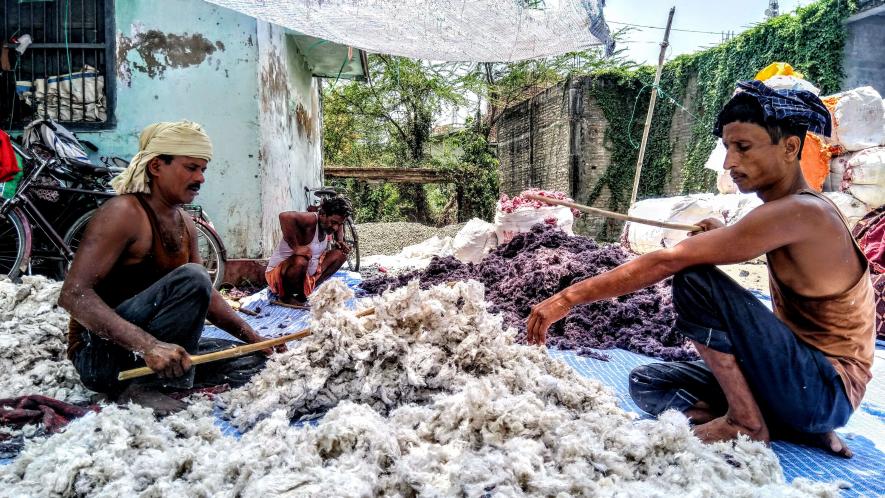
None of the workers wants their kids to come into the profession of cotton carding.
“Abhi barsat me baithaki ho jai…ab jathi bachal kuchal rahi…uhe se kharchi chali…bahaniyon na hola shavan badho mein (There will be no work in rainy season; we somehow have to manage with our meagre savings),” says Mohammed Nasirullah who is bundling cotton sheaves which would be adjusted on the peripheries of the mattress.
In summer and rainy seasons, Mohammed Saheb says rarely any customer comes. He explains, “Suppose we sell one toshak (mattress) in a day, there will be a collective earning of Rs 500 for the group of 10. Each person will get Rs 50 for their hard work.”
Mohammed Saheb, who is stitching a blanket cover, hasn’t received any government ration for a year. As his name from the ration list stands eliminated, he has to buy rice at Rs 26 per kg. He is also forced to buy kerosene from the black market which is sold for Rs 50 per litre. Saheb says, “The financial condition of my family worsened last year to an extent that I had to flee to Kashmir.” He worked as a mason in Rajbagh, Srinagar, on the daily wage of Rs 600; he returned to Champaran in January this year. “I learnt masonry skills when I was a kid; I knew that this profession would render me jobless in off seasons.”
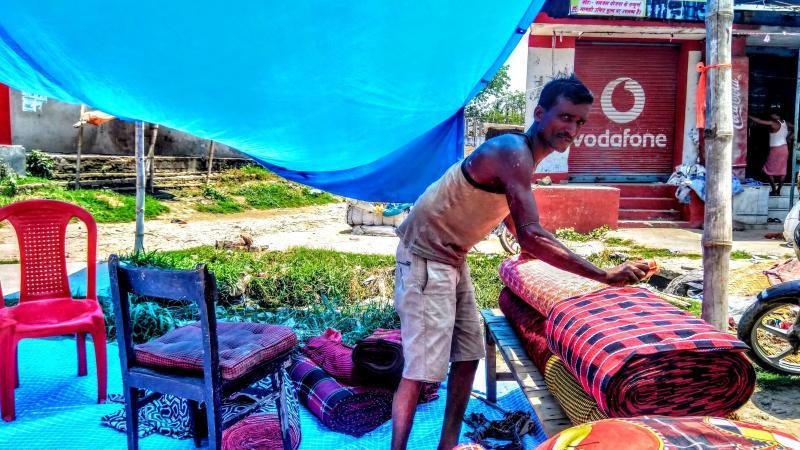
Nazir lives in a kuccha house; he was denied the governmentâs housing scheme.
A group of 14 people of the Muslim Dhunia community daily flock from Banswaria area of West Champaran’s to Kachhari area, three kilometers apart, to do their traditional job of cotton carding in the backyard of the Mohammed Aamir’s stall which has been rented at Rs 2,000 per month.
Separate tasks are internally assigned to each worker; division of workload eases the process. Some weigh raw cotton while some others have to clean it, after which it is stuffed in mattresses, pillows and blankets, and then stitched.
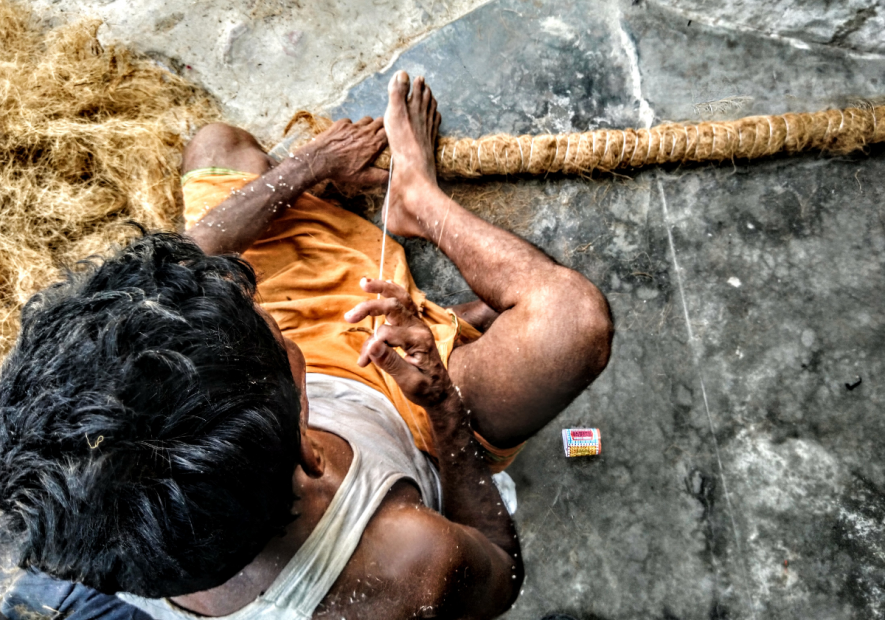
As monsoon kicks in, Nasir will have no work.
Feku Miya, 55, commutes to the workplace by autorickshaw that charges Rs.10 for a ride; when there is no income, he has no option except to return home on foot. He has been working here for 10 years. Earlier, he used to work in another stall near Bada Ramana area of the district.
“Some give Rs 200, some give Rs 300, and sometimes we also end up with profit of Rs 500," says Feku. A small argument with a shop owner can wipe out the whole day’s income. “Koi AC me chalata, koi ghaam me jarata (Some are travelling in air-conditioned cars, some are burning under the scorching sun).” he adds.
“Where we can go? Who will listen to us?” he questions.
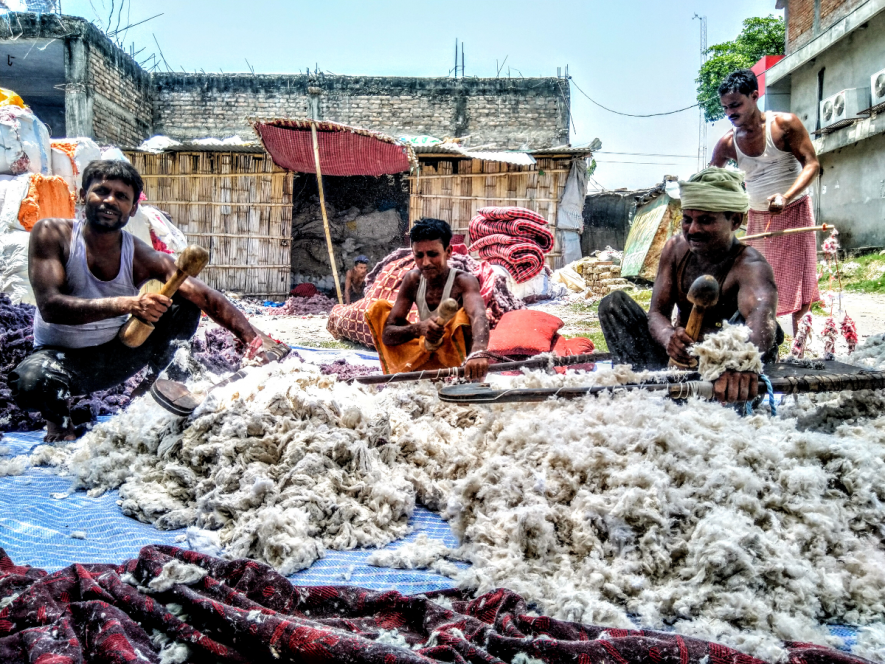
Manoj Miya using the traditional bowstring instrument used for fluffing cotton which is called Dhanui.
Manoj Miya, 35, is re-fluffing the cotton with Dhanui, the traditional bowstring that is harp-shaped with a string wrapped from one end to the other. The dumbbell shaped wooden mallet is struck across the vibrating bowstring, cotton bolls passed through the bowstring are scattered into cotton fluffs and dirt is dispersed.
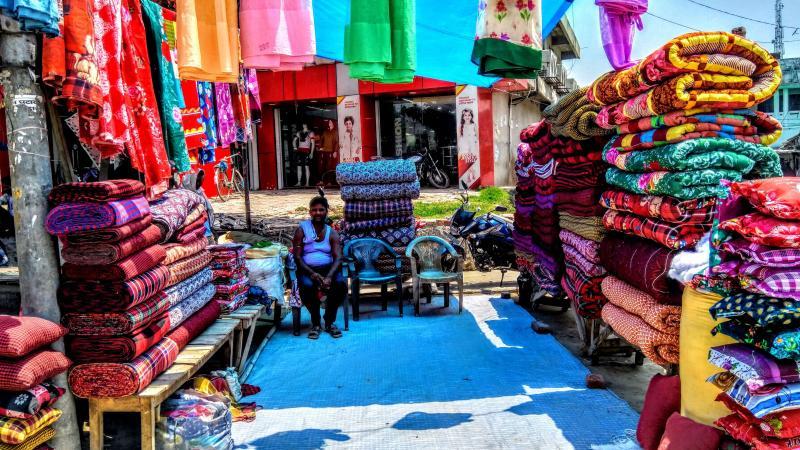
The stall is only source of income for Aamir to support his family of eight people.
There was no money, Manoj says, to buy new clothes for my kids. He borrowed Rs 3,000 from someone during Eid, which he has just repaid. “We are daily wage labourers. Our parents didn’t gift us any property or jewellery. We were left with two hands, two eyes and two legs to search for food.”
“Abe ihe na jiye ke zariya hai tabo hamar bhai ke kha gael (This is the life-support but my brother died doing this),” Manoj says about his brother who [was in his 30s] died of unknown reasons. “The life expectancy in the Dhunia community is not more than 65 years; the fibre dust causes various respiratory diseases [referring to Byssinosis],” he adds.
None of the workers wants their kids to come into this profession. “Laika sab padhkar nokari chakari karega…dimag lagayega toh S.P.-Collector bhiban sakta hai..kahe dhunia ka baccha saheb nahi ban sakta (My children will study to do some professional job…if they do hard work, they may become bureaucrats…can’t a Dhunia’s kid become an officer),” Mohammed Chhedi is motivated to invest in the higher education of his children who are in a primary school at present.
“Abhi lagan ba tani milal ba kam, okar bad kachi? (We have some orders for now because of wedding season, what after that?” Chhedi, scoffing at his profession, maintains that the fluctuating nature of cotton carding sector is the reason behind the economic backwardness of the community. He wants the government to ensure job security by opening some carding centres in the district, thus organising this trade sector.
“Those in the village side are getting the money under housing scheme (Awas Yojana), but we haven’t been given a penny,” says Mohammed Nazir who is stuffing a pillow. He tells NewsClick that the Dhunia community of Baswaria was denied the benefit of any housing scheme.
Mohammed Aamir, the shop owner is also a Dhunia. He collected money by pulling rickshaws in off-season to pay for a shop of his own. Like those working under him, he was also a daily wage carder. Aamir is in a relatively better socio-economic position compared with the other community members. The stall, he stresses, is the sole source of income to feed his family of eight. Aamir’s adult son helps him in running this business.
Aamir could sell only one mattress till now for Rs 1200, with 20 kgs of cotton [@Rs. 40 per kg]. The net profit he made was Rs 200, after adjusting labour charges.
“People don’t go to the mall, they come to us. Our products have the fine touch,” says Aamir pointing at a mall behind him. “But we are harassed unlike mall owners. I have enough money to afford a municipality shop on a monthly basis but will they provide me?”
Aamir alleges that the sub-divisional magistrate’s security guard slapped him when he tried to stop him from throwing the products on ground. He says, “Policemen constantly come to harass us, they threaten to confiscate our wares. Why don’t they give us shops?”
The writer is an independent journalist and serves as an editor at Academia.edu. He writes on social inequality and rights in India.
Get the latest reports & analysis with people's perspective on Protests, movements & deep analytical videos, discussions of the current affairs in your Telegram app. Subscribe to NewsClick's Telegram channel & get Real-Time updates on stories, as they get published on our website.
























